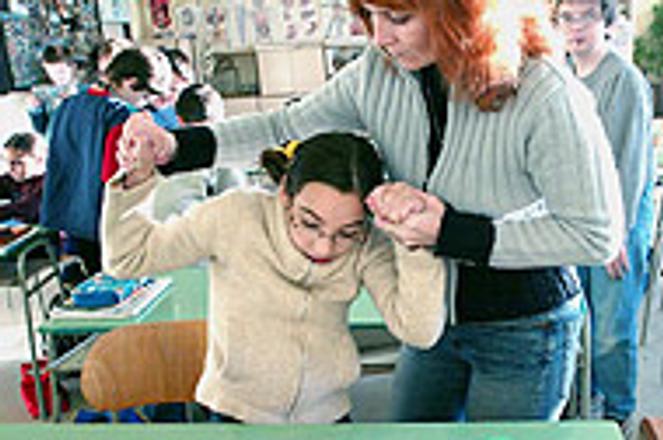Schools open to innovative education programmes might get help from EU funds.
photo: SME - Ján Krošlák
POOR preparation is one of the most common reasons why projects applying for financial support from European Union funds are not approved.
The mainly small and mid-sized Slovak businesses that apply for this money tend to lack experience in designing projects that meet EU rules, and regional governments and schools are not much better off. The services of consultancy firms can help, but they are often too expensive for small businesses looking for financing.
But now, with two free consultancy services on the market, Slovak companies have access to professional help that could see an increase in the number of successful projects.
Consultancy about ESF
"The most common reasons that Slovak applicants for financial resources from EU funds are not successful is that their projects do not comply with the tender conditions [for proposals]. Shortcomings include budget and technical problems, [poor] quality of projects, and insufficient knowledge of project and financial management," said Marián Kolenčík, director of the Euroformes company.
Euroformes recently launched a project called "Preparing for the Use of European Social Fund (ESF) Resources at the Municipal and Regional Levels". Its aim is to eliminate errors in the creation and submission of applications for support from the ESF.
As the ESF focuses on support for employment and education, the Euroformes training project is oriented mainly towards local governments, public and private schools and churches.
The project was ordered by the Ministry of Labour, Social Affairs, and Family and was financed through the PHARE pre-accession fund. "The maximum volume of money that is possible to use for the project is €1.2 million," ministry spokesman Martin Danko told The Slovak Spectator.
Euroformes began the project with a survey of how much possible applicants knew about ESF from among Slovakia's local governments, schools, NGOs, educational and cultural institutions, social services, and regional chambers.
"More than half the respondents expressed interest in getting support for designing a project, while two-thirds wanted to be enrolled on the list of potential applicants for help in the region and to get regular information about ESF activities. The most wanted activities were information seminars, and longer term consultation and training in the project preparation phase," said Enzo Luigi Marcon, head of the project team.
In the first stage, Euroformes trained 16 experts/lecturers, 2 for each Slovak region. In the second phase the agency started training future project managers.
By the time the project is over in October 2006, about 240 project managers should be ready to submit proposals for ESF contributions.
"One of the great advantages is that the applicants do not have to travel to Bratislava to consult on their projects, they can do it in the regions as well," added Valéria Kubová, the Bratislava region expert.
Rise with Vzostup
Unlike the Euroformes project, the "Vzostup" (Ascent) EU grant consultancy project is a private sector initiative.
IT companies Microsoft, Hewlett-Packard, and Intel decided to support a consultancy project for SMEs, regional governments and NGOs. The project is managed by the Octigon consultancy firm.
"Developing SMEs is the key to economic growth. That's why we decided to create an EU grant support system. Today, it [the system] is operating in 18 countries. When we conducted a survey, the majority of SMEs didn't even know how to acquire the grants. We help them find out about these projects and we give them consultations," said Róbert Šimončič, the general manager of Microsoft Slovakia.
The Internet portal www.vzostup.sk provides an updated database of grants, a small grant dictionary and detailed information about individual grants.
Registration on the web page is free, following which firms are automatically informed of each change on the website, and can arrange a free consultation.
Consultations include an evaluation of a firm's chance to get a grant, a cost-benefit analysis, and the design and submission of grant applications.
"Many people are discouraged when they click on a ministry webpage and try to look for information about the funds. The benefit of this webpage is that it gives clear information and free consultancy," said Peter Weber, general manager of Hewlett-Packard Slovensko.
IT companies say the consultancy service is intended for various branches and industries, not just the IT sector. They know that if the number of successful projects rises, the SME sector will benefit, creating new demand for IT services as well.
Radoslav Drobný, a consultant with Octigon, has set a target of around 300 clients in 2006.
The European Union created €117 billion in funds for supporting growth and innovation. It is estimated that about 50 percent of SMEs do not know they meet the conditions for receiving a grant.
Private companies can gain money from these funds for a concrete development project to a maximum of 49 percent of the projected costs. In the case of non-commercial entities, the coverage can be 100 percent of costs.


